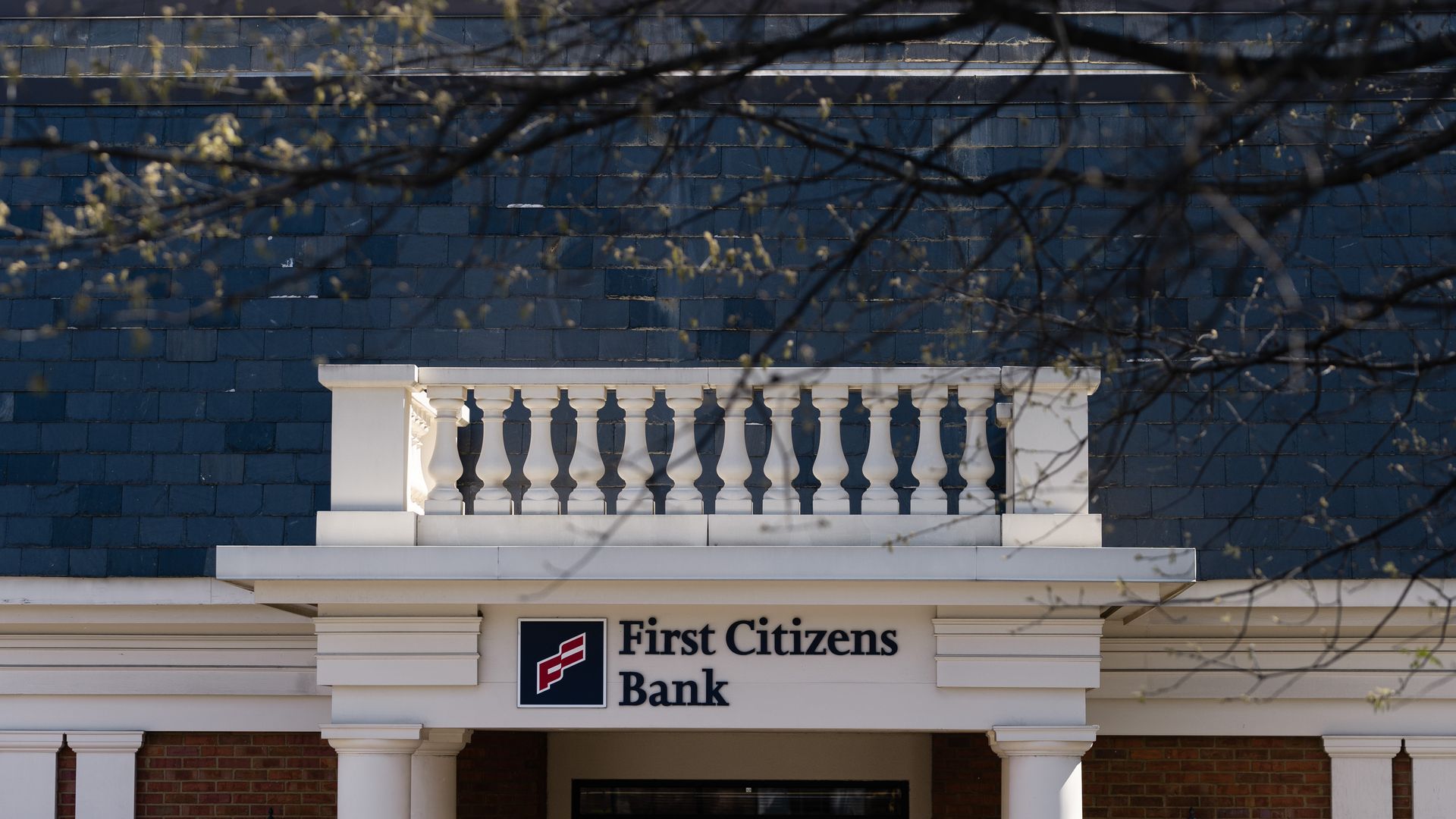First Citizens eyes more influence in tech industry with SVB purchase
Add Axios as your preferred source to
see more of our stories on Google.

A First Citizens Bank branch. Photo: Elijah Nouvelage/Bloomberg via Getty Images
Raleigh's First Citizens Bank is buying the remnants of the collapsed Silicon Valley Bank — a move that will make the Smithfield-founded company one of the 25 largest banks in the country.
Why it matters: The sale is a step toward stabilizing America's regional banking sector, after a month of tumult.
- It's also a show of might by a Raleigh bank that is relatively unknown despite being one of the largest regional banks in the country.
- First Citizens had $109 billion in assets at the end of last year. And while it has branches across the U.S., more than 50% of its deposits in 2021 were in North Carolina, according to its annual report.
The intrigue: It's remarkable that a Raleigh bank now owns Silicon Valley's namesake financial institution, Axios' Dan Primack writes. For years it was impossible to get a direct flight between RDU and SFO, with many Research Triangle Park founders complaining that it hampered their ability to secure venture capital.
- Silicon Valley Bank only covered the area with a handful of bankers, for example.
First Citizens CEO Frank Holding Jr. told investors on Monday that the acquisition would improve the bank's existing business in the technology sector.
- "While I know First Citizens is not well known for expertise in the digital innovation economy, our home market Raleigh is ranked second behind Silicon Valley in terms of commercial real estate growth in the innovation market over the past two years," he added.
- "There are similarities between Silicon Valley bank's client base and products and First Citizens' support of biotechnology and technology companies, both in the greater Triangle area and nationwide."
Much of that success could ride on First Citizens banks ability to retain bankers from Silicon Valley Bank as well as its account owners.
What they're saying: Many Triangle locals woke up Monday morning hopeful that the sale could bring more attention to the region's growing technology scene, given Silicon Valley Bank's huge influence in the industry.
- "North Carolina startups have to fight hard for attention from VCs so hopefully this will help," Adam Smith, co-founder of the Durham startup Wrangle, told Axios. "SVB covered all of South Carolina and North Carolina with two to three bankers, so if they continue to operate as a venture bank long run, being based here will absolutely raise the profile of the area and should help our entrepreneurs."
- "This acquisition could lead to talented professionals relocating from Silicon Valley to the Triangle area," Yunzhi Hu, an assistant professor of finance at UNC's Kenan-Flagler Business School, told Axios in an email. "Instead of flowing into Austin, Raleigh now becomes quite attractive."
Flashback: First Citizens, founded 125 years ago and run by the Holding family, came into the year as America's 30th largest bank. Now, it is poised to absorb much of an institution that had been the 16th largest.
- It's also a bit of FDIC full circle for First Citizens. Last year it bought CIT, which in 2015 bought OneWest, which in 2009 bought the assets of IndyMac from the FDIC.
Details: SVB's 17 branches will reopen under the First Citizens brand on Monday, and all SVB depositors will become depositors of First Citizens, according to a Federal Deposit Insurance Corporation (FDIC) press release.
What's included: First Citizens will assume $56.5 billion of deposits and $72.1 billion of loans from the FDIC, the latter of which came with a $16.5 billion discount.
- The bank also entered into a loss-share agreement with the FDIC, of up to 50% on loan losses in excess of $5 billion.
- FDIC estimates that SVB will cost up to a $20 billion loss from its Deposit Insurance Fund (which is backed by insured banks, not taxpayers). FDIC received equity appreciation rights in First Citizens with a potential value of up to $500 million (payable in cash) and exercisable until April 14, 2023.
What's not included: SVB's securities business and its venture capital investment portfolio.
- Overall, the FDIC still retains around $90 billion of SVB assets, most of which is its long-dated securities portfolio.

